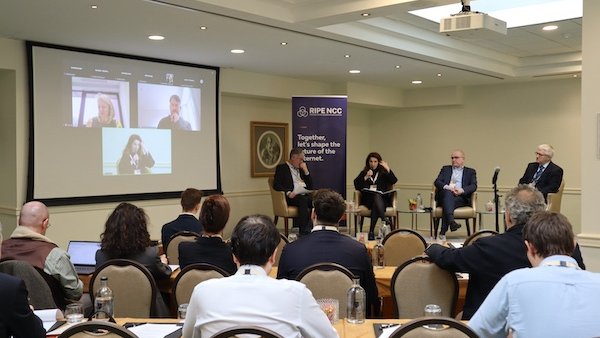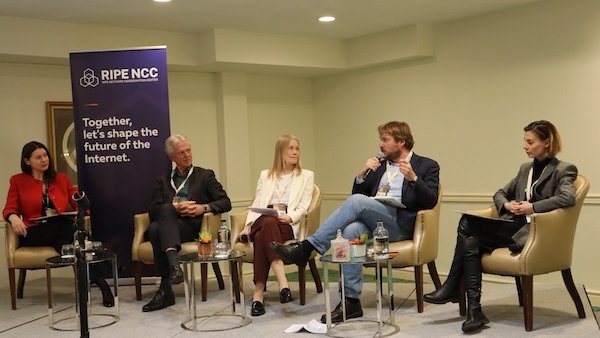Meeting Report


On Wednesday, 19 February 2025, the RIPE NCC held its annual European Roundtable Meeting gathering 75 participants, including representatives of EU institutions, governments and national regulators, alongside participants from the Internet technical community and academia.
The meeting, held under the Chatham House Rule, started with welcoming remarks that emphasised the importance for the RIPE NCC to build more resilience in the face of geopolitical and regulatory developments, and to engage with policymakers and regulators in order to foster open dialogues and build mutual understanding at this critical juncture.
Our guest keynote speaker presented relevant priorities of the Polish Presidency of the Council of the EU, which include initiatives in cybersecurity, artificial intelligence (AI) and emerging technologies. Another key focus is digital diplomacy, particularly in building partnerships and cooperating with countries in the Middle East and Africa to support the development of digital infrastructure. Regarding Internet governance, he highlighted the promotion of the multistakeholder approach as a crucial priority to prepare for the several important milestones occurring this year.
Speakers in the first panel discussed the review of the World Summit on the Information Society (WSIS)+20 and its key steps. Most participants agreed that the EU should present a united front and strive to uphold a diplomatic framework that has yielded positive results over the past 20 years. This unity and leadership should extend not only among the EU member states but seek to solidify a broad “EU+” coalition of international partners and stakeholders. Given the challenging geopolitical context, participants thought that partners within the Freedom Online Coalition (FOC) and members of the Council of Europe should lead and work closer together to support a constructive and inclusive approach to Internet governance.
There was a consensus among participants that governments need to engage with non-governmental stakeholders as part of the WSIS+20 review process. Speakers emphasised the significant contributions of the Internet's technical and academic communities in achieving the UN Sustainable Development Goals (SDGs). Similarly, Internet governance bodies and technology organisations were praised for playing a crucial role in managing the infrastructure that supports the SDGs. These organisations should step up their efforts to collaborate with governments in shaping the future of the WSIS process. Participants discussed the role of the Internet Governance Forum (IGF) as an essential platform for such inclusive engagement, while recalling that the WSIS+20 remained fundamentally an intergovernmental decision-making procedure. Participants suggested several ideas, including creating better synergies across the IGF and the whole WSIS architecture, leveraging the IGF to support and monitor the implementation of the Global Digital Compact (GDC) and incorporating more bottom-up elements inspired by Internet governance bodies into multilateral processes. There was a strong agreement that the IGF should remain the primary multistakeholder forum for these discussions.
The second panel explored the development of norms and processes aimed at safeguarding the interoperability, availability, and integrity of the global Internet. Speakers discussed key challenges related to the global management of unique Internet identifiers, such as increasing risks of misaligned policies, conflicting laws and jurisdictions, Internet fragmentation and concerns about legitimacy and control. They also emphasised the important role of diplomacy in addressing issues of state sovereignty, cybersecurity and Internet governance.
Participants also debated the notion of the Internet as a common public good, including references to the concept of the "public core of the Internet" as advanced by the Global Commission on the Stability of Cyberspace (GCSC) and discussed in the UN First Committee. Some speakers noted ambiguity in the use of the term "public". Nonetheless, there was strong emphasis on the absolute need to preserve the open standards and protocols that enable a secure, global and interoperable Internet. In an increasingly fragmented geopolitical environment, the technical community’s role in maintaining trust in Internet coordination bodies and supporting inclusive governance remains essential.
Finally, the event gave the opportunity for the RIPE NCC to provide insights into its operations and priorities. These include, for example, ongoing efforts to enhance information security and risk management across the organisation, and contributing input to various ongoing public policy and governance discussions – such as the RIPE NCC’s contribution to the ITU’s WSIS+20 consultation, and research into recent events affecting subsea cables and their impact on global Internet traffic.